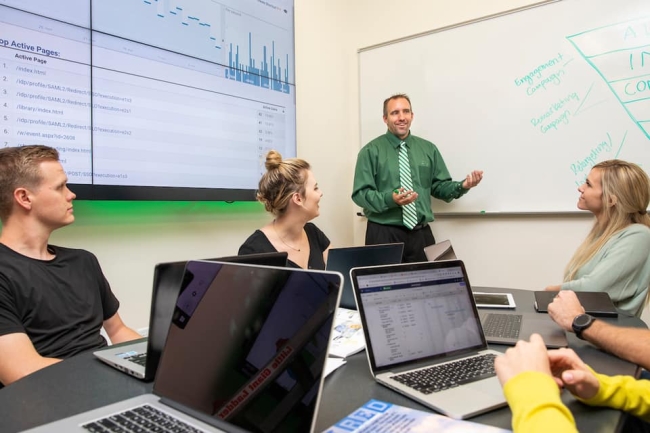You have /5 articles left.
Sign up for a free account or log in.

Dave Przybyla teaches a group of marketing students in 2019 at Utah Valley University. Przybyla serves as the adviser for the Green House, a student-run agency on campus.
The Green House
In today’s job market, it is more critical than ever to provide students with hands-on experience during their undergraduate experience. An August survey of 500 hiring managers found 52 percent of respondents considered experience the most important factor when evaluating candidates.
Looking to give his students a better leg up in the industry with hands-on experience, one professor at Utah Valley University created a student-run digital marketing agency.
The Green House launched in spring 2022, providing around 18 students with paid, relevant work experience each term and preparing them for future careers.
What’s the need: In their business capstone courses, UVU’s digital marketing students traditionally would partner with a local organization their senior year to complete an active client project. The capstone initiative worked well for many years, with 42 graduates since being hired out by client partners, but it became clear students needed more than one project’s worth of experience before graduating.
The marketing department has an advisory board of professionals and alumni and, two years ago, one executive told Professor David Przybyla that, without experience, his students would graduate and be hired as interns rather than as full-time staff.
“That was a catalyst moment of, ‘OK, we’ve got to do something different for our students,’” Przybyla says. “That’s what really pushed the Green House.”
How it works: The Green House is a student-run and -managed initiative. The agency has around 18 paid interns each term, stretching across years and majors.
Przybyla serves as an adviser and mentor alongside six active business professionals, many of whom are UVU alumni.
Student employees commit to 20 hours of in-person work a week for $12.75 an hour (the university minimum). Students are grouped in teams of five, reporting to a project manager and a communications manager, with three lower-level students serving as interns. Those who take on leadership roles receive a small pay bump, as well.
The agency provides each client with a 12-week strategy, called the Fertilizer Package, which includes reputation management, search engine optimization, a social media audit and a paid media audit. “From there, we can scale into areas of specialty that the business might want,” Przybyla says.
The Green House has also partnered with a range of departments in the business school to meet client demands. This past semester, the team partnered with UVU’s professional sales capstone class to acquire clients. All students are required to make one sale for the Green House to pass the course, which provides 80 percent of all client leads.
“If they’re gonna go into sales, you better know how to do it,” Przybyla says.
Students in other courses, like social media and content writing, provide additional services, expanding real work learning opportunities beyond the Green House team.
The challenges: The Green House has earned over $110,000 from client work, but continual funding remains a challenge for the organization to become sustainable. Przybyla used his own money to launch the agency, and department partners have supported its growth with grant funding.
All clients are given a money-back guarantee, as well, which is important to build confidence in clients investing in student projects.
Because the Green House is designed to move students into full-time marketing roles, there’s a high level of turnover, as well, Przybyla says.
The agency hires students three times a year, at the end of each term and during the summer. At present, the group is looking to fill four vacancies in December and has 25 students on the application wait list.
To support continual onboarding, Przybyla created “just-in-time” training to allow students to jump straight into projects. Each project has “micro trainings” embedded into individual tasks, so each assignment that comes from a project manager also includes a how-to guide and video.
The just-in-time trainings are supplemented by video lectures from Przybyla that explain the importance and the intentionality behind each task to make them more strategic in their work.
The impact: In the past 18 months, the Green House has serviced over 50 businesses from a variety of industries with 60 paid interns. Of the interns, 75 percent lacked previous experience, 30 percent are from diverse backgrounds and 37 percent are first-generation students.
In addition to getting hands-on experience, students are growing their human skills of communication, conflict management, initiative and confidence, Przybyla says. “We not only want to teach them the digital marketing skills—we want to prepare them for advancement, and I think there’s no better way than actually making them talk to a tough client on a real conversation.”
If your student success program has a unique feature or twist, we’d like to know about it. Click here to submit.




